14 Best Play-to-Earn Games with High Earning Potential in 2024
Crypto has revolutionized gaming in that it has made it possible for anyone to play games and earn at the same time; something that was previously only possible for pro gamers.
While P2E gaming is still in its infancy and it will take time for the gaming experience to be as high compared to with traditional games, it distinguishes itself by allowing players to earn in-game assets and free crypto tokens.
We searched the market for the best play to earn games with the highest earning potential and found the top 14 that provide the best crypto rewards. Let’s get into the reviews of each game that pays players in crypto and all the other ways they benefit investors.
List of P2E Games with the Highest Crypto Rewards
- First of its kind daily rewards based on the performance of Mega Dice Casino
- $DICE holders can enjoy 25% rev-share through the Mega Dice Referral Program
- $2,250,000+ USD airdrop for casino players
- Solana
- ETH
- bnb
- Trending meme coin with P2E utility & staking rewards
- Price up 10x in past month, rumors of Binance listing
- 12k+ holders and growing
- Bank Card
- usdt
- ETH
- Innovatives VR & AR Gaming Project
- Aiming to Raise $15M Across 12 Rounds
- Token Holders Get Lifetime Access to VR Content
- ETH
- usdt
- Bank Card
- New meme coin offering an immersive experience via high-stakes battles
- Participants can buy and stake $SHIBASHOOT tokens for rewards in excess of 25,000% p/a
- Token holders can cast votes on key project decisions and try their luck in the 'Lucky Lasso Lotteries'
- ETH
- usdt
- bnb
- Learn-to-Earn platform that rewards users for learning about crypto
- Stake $99BTC tokens in secure smart contract to earn passive rewards
- Get the edge in fast-moving markets with expert crypto trading signals
- ETH
- usdt
- Bank Card
- +1 more
- Innovative AI crypto casino offering staking, airdrops and custom games
- $HPLT presale has raised over $400k so far with +60M bets placed by +150k users
- Offers daily staking rewards, hype NFTs and is fully audited by Certik
- bnb
- ETH
- usdt
- Infinitely upgradeable AI meme coin, with modular technological capabilities.
- Huge staking rewards available everyday during presale.
- Presale price rises every two days - buy now to benefit from best price before listing.
- ETH
- usdt
The Best Play to Earn Games Ranked
Let’s have a quick look at each of the best play to earn games before deep diving into them.
- Mega Dice Token (DICE) – Best P2E CasinoFi crypto, get staking yields and NFTs.
- Sponge V2 (SPONGEV2) – Meme coin with proven history launching P2E game. 182% APYs.
- 5th Scape (5SCAPE) – AR and VR hyper-realistic gaming environment. $5.6 million raised.
- Shiba Shootout (SHIBASHOOT) – Western-themed meme coin with multiple perks. $225K raised.
- Hypeloot (HLPT) – Popular AI Crypto Casino, 150,000 Users And Staking Rewards.
- WienerAI (WAI) – New AI meme coin coming to shake up the crypto gaming space.
- Gas Wizard (GWIZ) – An upcoming play-to-earn game combined with real-life utility.
- BlastUp (BLP) – Crypto launchpad with staking and other rewards for BLP token holders.
- Gods Unchained (GODS) – Award-winning game releasing a mobile version in 2024.
- Splinterlands (BAT) – Leading gaming platform with exclusive NFT mint.
- Axie Infinity (AXS) – Globally-known blockchain game releasing Land NFTs.
- Shrapnel (SHRAP) – First-person shooter released on Epic Games in Q1 of 2024.
- Star Atlas (ATLAS) – Grand strategy game enabling space exploration.
- Heroes of Mavia (MAVIA) – Earn in-game resources, trade them for NFTs and crypto.
Reviewing the Top P2E Games
Now that we’ve identified free play-to-earn games, let’s find out more about them.
1. Mega Dice Token – Best Play-to-Earn Crypto Offers Daily Bonuses and NFTs
We have picked Mega Dice Token ($DICE) as the best play-to-earn token in 2024. It powers the Mega Dice Casino – which offers access to over 4,500+ casino games and sports betting markets. With the $DICE token, investors are eligible for a range of exclusive gaming rewards. Firstly, tokens can be staked across three pools – ranging from 10 days to six months in length. On this P2E platform, users can take part in casino games, and earn daily token rewards depending on their performance. 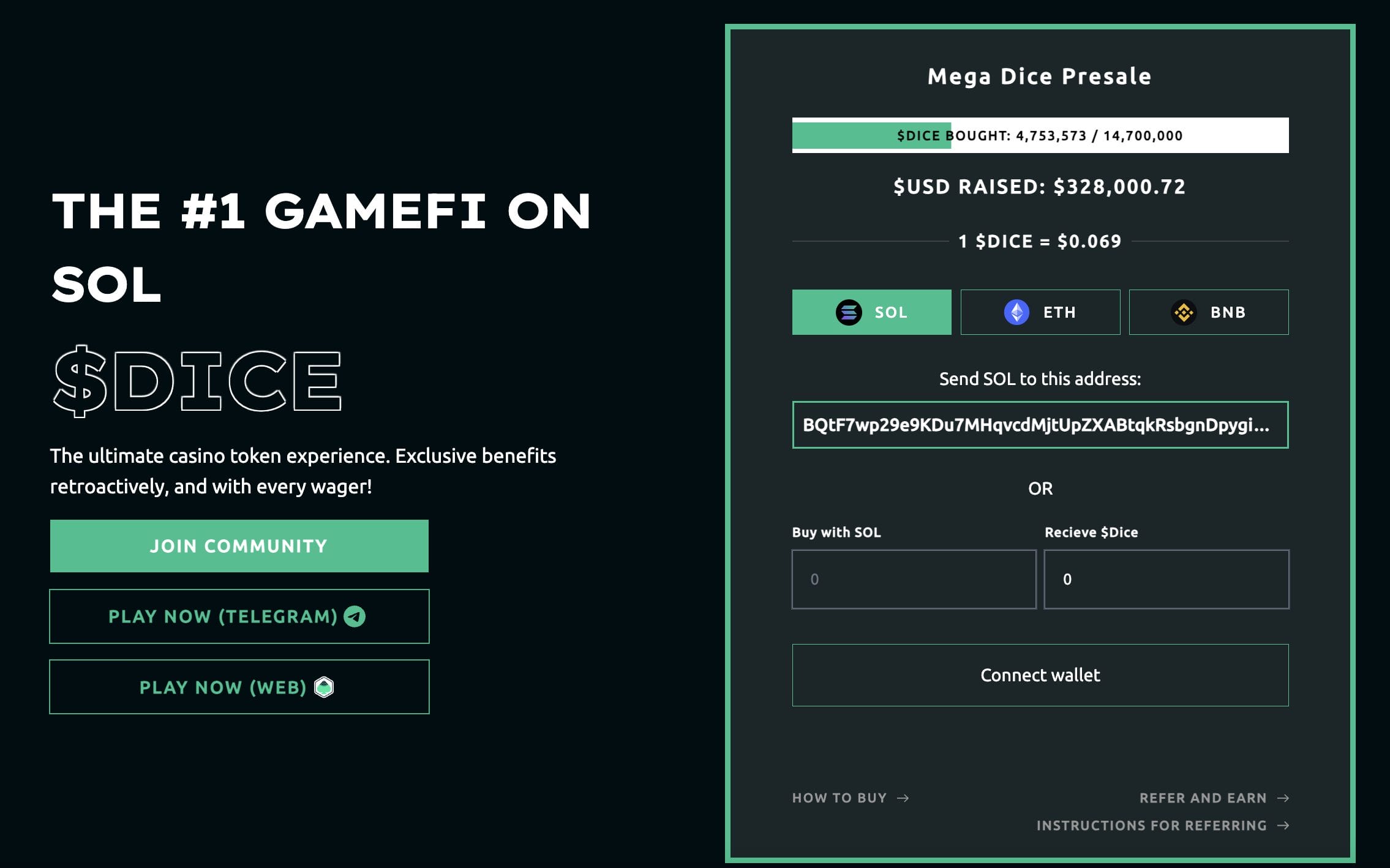 With the $DICE token, Mega Dice offers limited edition NFTs, which can be leveraged to extract exclusive rewards. You can also trade the NFTs on Mega Dice. This token offers transparency and security as it is built on the Solana blockchain. Thus, token holders benefit from quick transaction times and high throughput. Currently, $DICE is available to purchase for $0.069 through the first presale round. Early presale investors will also earn free tokens on the platform. Mega Dice Token has a total supply of 420 million, of which 147 million are being offered through the presale. Since the launch of the presale, Mega Dice Token has raised over $320K. The goal is to raise a hard cap of $10 million. Learn more about this gambling token by going through the Mega Dice Token whitepaper and joining the Telegram channel. Key Takeaways
With the $DICE token, Mega Dice offers limited edition NFTs, which can be leveraged to extract exclusive rewards. You can also trade the NFTs on Mega Dice. This token offers transparency and security as it is built on the Solana blockchain. Thus, token holders benefit from quick transaction times and high throughput. Currently, $DICE is available to purchase for $0.069 through the first presale round. Early presale investors will also earn free tokens on the platform. Mega Dice Token has a total supply of 420 million, of which 147 million are being offered through the presale. Since the launch of the presale, Mega Dice Token has raised over $320K. The goal is to raise a hard cap of $10 million. Learn more about this gambling token by going through the Mega Dice Token whitepaper and joining the Telegram channel. Key Takeaways
- $DICE offers staking yields, access to NFTs, and daily rewards on casino games.
- The Mega Dice Token has raised over $320K since the launch of the presale.
- It is built on Solana – one of the fastest and most efficient blockchains in the world.
2. Sponge V2 — Meme Coin with Proven History, Launching a P2E Game
is a reboot of the hugely successful Sponge V1 meme coin, that completed a 100x upon its first launch. In this reboot, Sponge V1 is moving to a new smart contract, which will give the token improved utility and increase the token supply.
If you hold Sponge V1, you can stake it on the new smart contract. If you don’t, you can buy it at market price through the Sponge website. Your newly purchased tokens will be automatically staked on the Sponge V2 smart contract, and earn you a healthy APY, currently running at 165%.
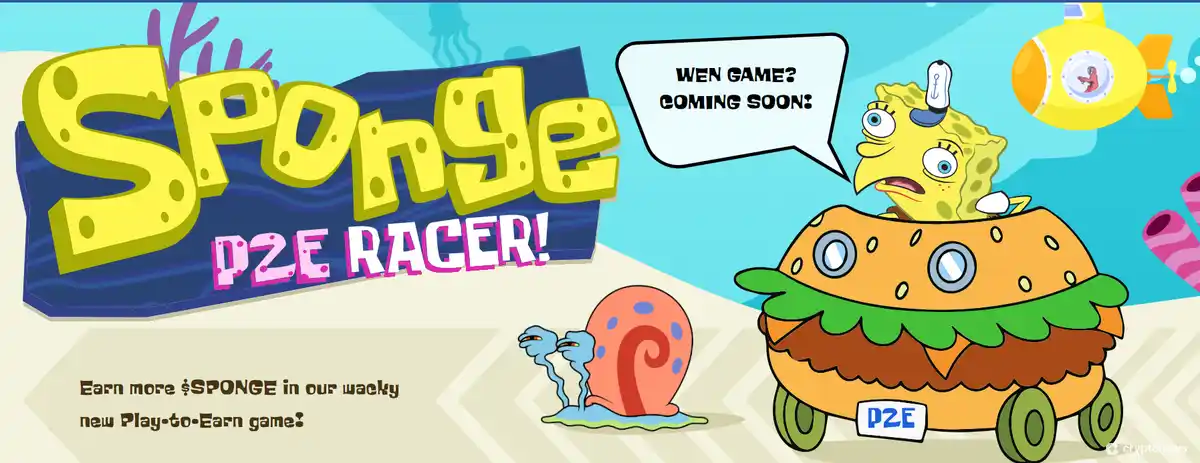
The reboot of Sponge comes with a play-to-earn game, Racer Game. You can practice playing this game without paying for tokens. If you want to earn Sponge V2 tokens through the game, you need to buy gaming credits using your Sponge V2 tokens.
Learn more in the Sponge V2 whitepaper, by following Sponge on X, and by joining the Telegram community.
Key Takeaways
- Sponge V2, a reboot of Sponge V1, introduces a new smart contract improving token utility and increasing supply.
- Holders of Sponge V1 can stake their tokens on the new contract, while new buyers can purchase and stake directly from the Sponge website, earning a high APY of 165%.
- Sponge V2 features a Racer Game. To earn tokens, purchase gaming credits using Sponge V2 tokens.
3. 5th Scape — World’s First VR and AR Gaming Ecosystem
The next top play-to-earn cryptocurrency game on our list is 5th Scape. This is the world’s first VR and AR blockchain game, offering hyper-realistic gaming experiences.
One of the first VR games this platform is developing is Cage Conquest, a VR world, where you can engage in dynamic combat and get a real sense of the MMA world. 5th Scape will also develop soccer and cricket-themed VR games.
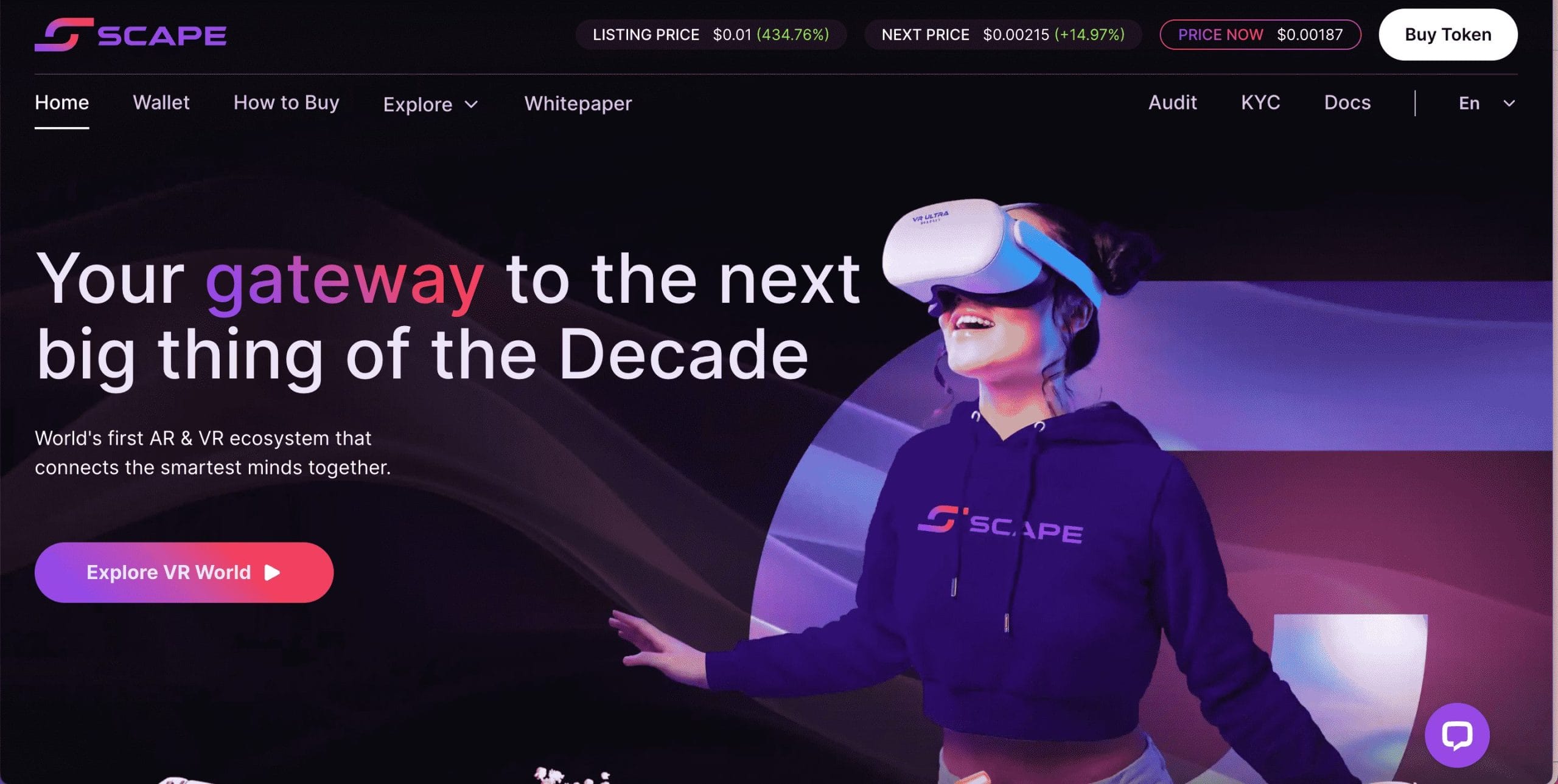
$5SCAPE token holders benefit from:
- Free lifetime access to a curated collection of VR gaming experiences
- Discounts on the VR gaming headsets and chairs offered by 5th Scape
- Early access to VR gaming content
For more information on this VR gaming cryptocurrency, read the 5th Scape whitepaper and join the Telegram channel.
Key Takeaways
- 5th Scape introduces the world’s first VR and AR blockchain game, offering hyper-realistic gaming experiences.
- Features Cage Conquest, a dynamic VR MMA world, with plans for soccer and cricket-themed VR games.
- $5SCAPE token holders enjoy free lifetime VR game access, discounts on VR gear, and early content access.
4. Shiba Shootout – Western-themed Meme Coin with Multiple Perks
Shiba Shootout has created an ecosystem full of Western-themed battles featuring quick draws, bounties, and exploration of the frontier in search of more treasure. This interesting backdrop also introduces multiple benefits to the ecosystem, where even positively engaging with the platform can be construed as a game.
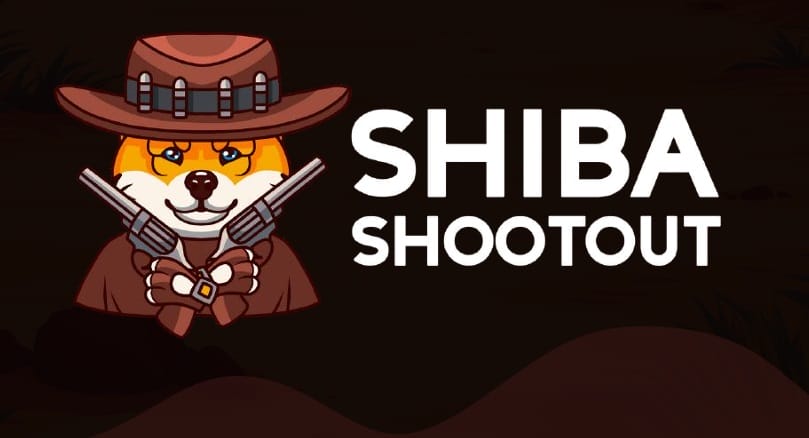
Shiba Shootout features Shiba Gulch, a beautiful town on the frontiers of the crypto sphere. Located in the desert and full of cowboys and bounty hunters, this backdrop features characters like Marshall and the Shiba Sharpshooters. The town also features a saloon where the community comes together to play games, share stories, and earn rewards.
Among the multiple perks that Shiba Shootout introduces are Posse Rewards, where those who refer Shiba Shootout earn SHIBSHOOT tokens. There are also staking perks known as Savings Saddlebags and Cactus staking. And for those who want to share memes and earn rewards, there is “Campfire Stories”.
Shiba Shootout has also integrated a DAO to give its followers control over the project’s developments.
Overall, Shiba Shootout is a crypto ecosystem where the essence of gaming is prevalent across multiple utilities. It has what it takes to thrive in the current ecosystem. For more information about its perks, you can check out its whitepaper. To keep an eye on its upcoming perks, we recommend connecting with the team via Telegram or Twitter.
Key Takeaways
- Shiba Shootout takes the meme coin genre into Western themes
- It features multiple passive and active earning perks
- It is a decentralized ecosystem with a DAO that can allow for the development of games
- $SHIBSHOOT holders will earn many benefits, including community rewards, airdrops, and staking
5. Hypeloot — Popular AI Crypto Casino with 150k Users and Staking Rewards
is one of the first AI-powered crypto casinos to offer profit sharing to its token holders. Since its launch in April 2022, Hypeloot has already attracted over 150,000 users worldwide and generated profits of over $1,000,000 in 2023. This showed massive investor trust and profit-generating capacity, which is uncommon among presales launching without a live products.
To enter the Hypeloot ecosystem, you need to purchase HPLT tokens, available for presale on the Hypeloot website. The presale is split into multiple pricing tiers, each offering distinct benefits.
Hypeloot’s launch of an AI-backed platform has made it an exciting option for investors in the crypto-casino space and gambling enthusiasts, especially with attractive features like profit sharing and high staking rewards.
You can follow Hypeloot on X and join its Telegram group for more information.
Key Takeaways
- Hypeloot is an AI-powered crypto casino offering profit sharing, attracting over 150,000 users and generating over $1,000,000 in profits since its launch.
- HPLT tokens are necessary for entry, available through a tiered presale on the Hypeloot website — each tier offers unique benefits.
- The platform combines AI technology with high staking rewards, making it appealing for both investors and gambling enthusiasts.
6. WienerAI – New AI Meme Coin Coming to Shake up the Crypto Gaming Space
presents a high degree of ambiguity with its features. Although it discusses AI, it never clearly defines it, only stating that its primary benefit is ‘infinite upgradability’. However, it presents itself as a meme coin, which means the potential of this gaming crypto to shake up the crypto gaming space is high.

WienerAI features an image described as part doge, part AI, and part sausage. This funny tone underlines the standard meme approach it has taken to entice the audience. However, what sets it apart is also the underlying AI-based perks.
WienerAI wants to create a gentler and kinder crypto space where AI is synonymous with companionship. It seeks a world where AI tools aren’t referred to as tools but as friends. Basically, it presents an AI community and is leveraging it to generate interest during its ongoing presale.
So far, the project has raised over $200k. Presale investors will also get to stake their tokens to compound their gains.
WienerAI is also very active on social media, boasting more than 1000 followers on Twitter and over 160 on Telegram.
Key Takeaways
- $WAI tokens aim to create an AI-driven community.
- The whitepaper talks about the creation of an ecosystem that’s infinitely upgradable.
- The ongoing $WAI presale features a multi-stage structure, allowing early buyers to potentially reap the highest profits.
7. Gas Wizard – New Play-to-Earn Game on Top of Real-World Utility
is an exciting crypto project that aims to help users pay less at the gas pump and the EV charging station via discounts and rewards. In addition to this real-world utility, the team has announced a play-to-earn mobile game where players can engage in various challenges with $GWIZ tokens at stake.
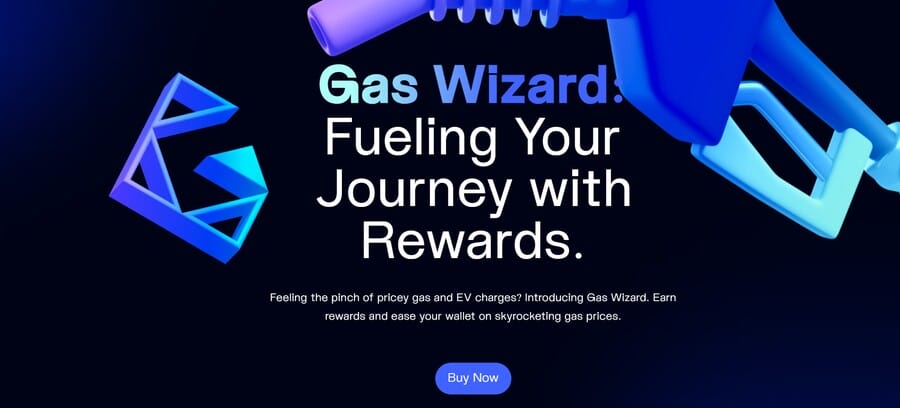
The team plans multiple game modes, including battles, puzzles and races. Whenever you challenge another player with $GWIZ tokens as the prize. The GWIZ tokens can be used to redeem rewards, participate in free gas tank giveaways or get discounts at the charging and gas stations.
The $GWIZ token is now available in a presale where each token costs $0.01. This is the first presale stage out of 10. Each consecutive stage comes with a higher token price, making early purchases potentially prudent.
Make sure to read the Gas Wizard whitepaper for more information. Also, follow Gas Wizard on X and join the Gas Wizard Telegram channel to stay up to date.
Key Takeaways
- $GWIZ is available in a presale.
- Earn $GWIZ by playing games and competing with other players.
- Use your $GWIZ rewards to pay less for gas or charging your EV.
8. BlastUp – Crypto Launchpad on Blast Layer 2 With Staking and Other Rewards
is a community backed launched pad for early-stage projects within the Blast layer 2 ecosystem. The BlastUp team helps projects prepare their tokenomics and raise capital in a decentralized way.
Its token, $BLP, is now in a presale phase where over $5 million have been raised by over 11,000 backers. Token holders who stake their $BLP get to earn Blast Points, and those with enough points are eligible for Blastbox airdrops. Each Blastbox can contain NFTs, ETH or stablecoins.
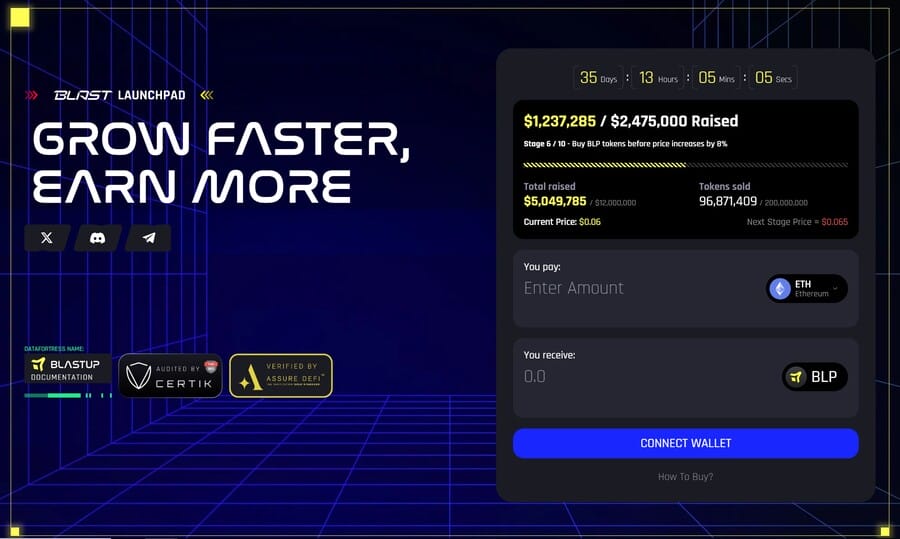
In the future, $BLP token holders will get tiered access to new IDOs and could earn tokens from the new projects that launch on the BlastUp launchpad.
Buying the $BLP token during the presale could be a good opportunity, given how the token goes for $0.06 during the current presale stage and will go to $0.065 in the next stage. At listing, the token is likely to trade for $0.1.
Check out the BlastUp whitepaper and follow BlastUp on X to get the latest information on the project and its presale.
Key Takeaways
- $BLP is available in a presale at a low price.
- Earn rewards by staking the token.
- Get tiered access to new IDOs that launch on the BlastUp launchpad.
9. Gods Unchained — Award-Winning Game Releasing a Mobile Version in 2024
The award-winning Gods Unchain NFT trading card game has been around for many years. It offers players multiple chances to earn crypto playing games (specifically $GODS tokens), along with the opportunity to earn and create NFT cards for their decks.
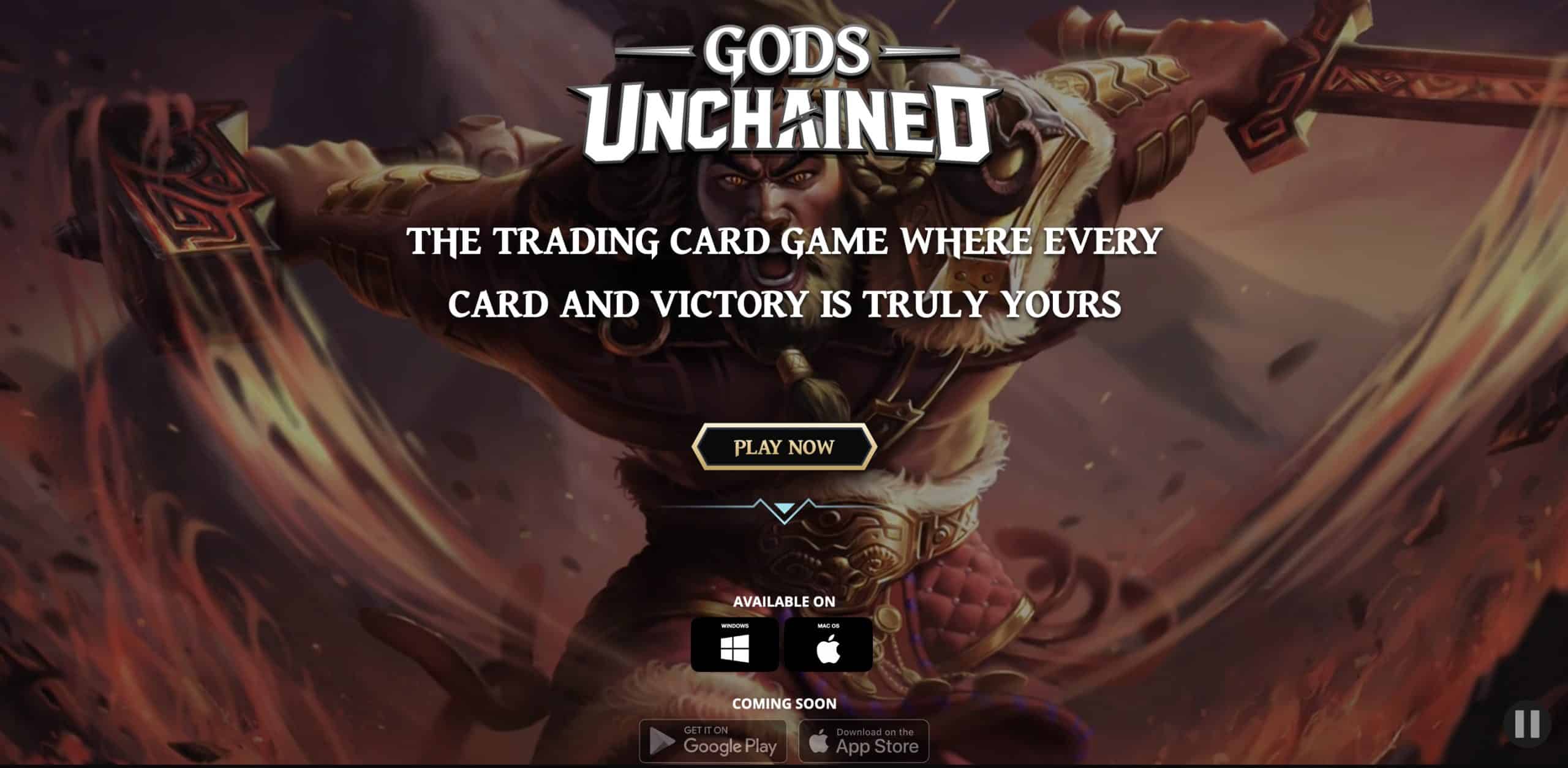
The game is free to play for newcomers, making it a highly accessible blockchain game for those who don’t quite yet know the workings of tokens, wallets, and NFTs, but are looking to dip their toes in the Web3 gaming water. This game is available on Amazon’s Prime Gaming and Epic Games Store.
What sets Gods Unchained apart is the extensive number of avenues you can use to earn $GODS tokens: weekend ranking events, daily playing, staking, and game campaigns. The mobile app was released recently, making the game accessible to even more players.
Key Takeaways
- Gods Unchained offers multiple earning opportunities through gameplay, staking, and participating in events to earn $GODS tokens and create NFT cards.
- Free to play and highly accessible for beginners, available on Amazon’s Prime Gaming and Epic Games Store, promoting easy entry into Web3 gaming.
- Recently launched mobile app expands accessibility, allowing more players to engage with the game and earn from virtually anywhere.
10. Splinterlands — Leading Gaming Platform with Exclusive NFT Mint
Splinterlands is one of the best play to earn crypto games, enabling you to own cards and other in-game assets as NFTs, which can be traded or used in battles and for earning rewards. These rewards depend on your opponent’s level and the capture rate you achieve in each combat.
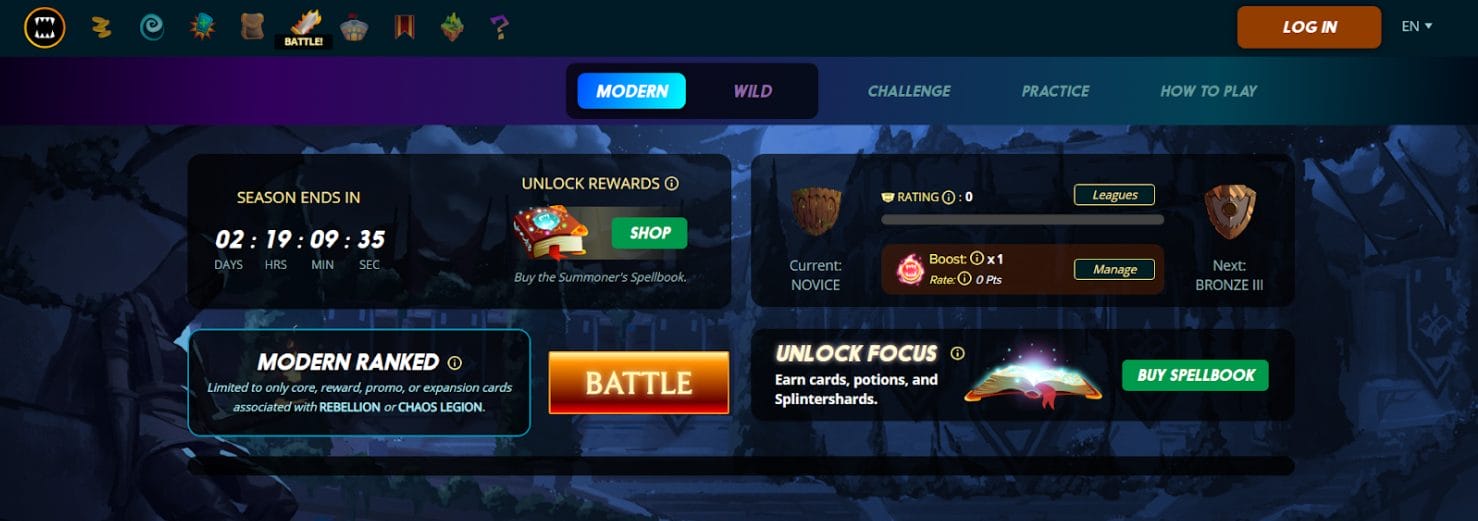
Splinterlands has been described as a hybrid of Pokemon card games and World of Warcraft characters. You can conquer a world or solve conquests by battling monsters. Initially, you’ll be provided with a limited number of cards; you can earn more by winning rounds.
You can also trade cards to earn DEC tokens. High-ranked cards are the most valuable and should generate the highest profits. Although DEC is the native token, Splinterlands’ partnership with BRAVE has made in-game purchases using BAT possible.
Key Takeaways
- Splinterlands allows you to own, trade, and battle with NFT cards, earning rewards based on combat outcomes and opponent levels.
- Described as a blend of Pokemon card mechanics and World of Warcraft characters, it offers diverse gameplay through battles and conquests.
- Supports trading cards for DEC tokens, with high-value cards yielding greater profits.
11. Axie Infinity — Globally-Known Play-to-Earn Game Releasing Land NFTs
Axie Infinity is a pioneering play-to-earn game on the Ethereum blockchain, where you can collect and raise Axies — adorable, battle-ready creatures with unique traits and abilities. As NFTs, each Axie is a unique digital asset that you can breed, battle, and trade. The game offers a rich ecosystem where 1.3 million users interact with over 11.8 billion possible Axie genetic combinations.
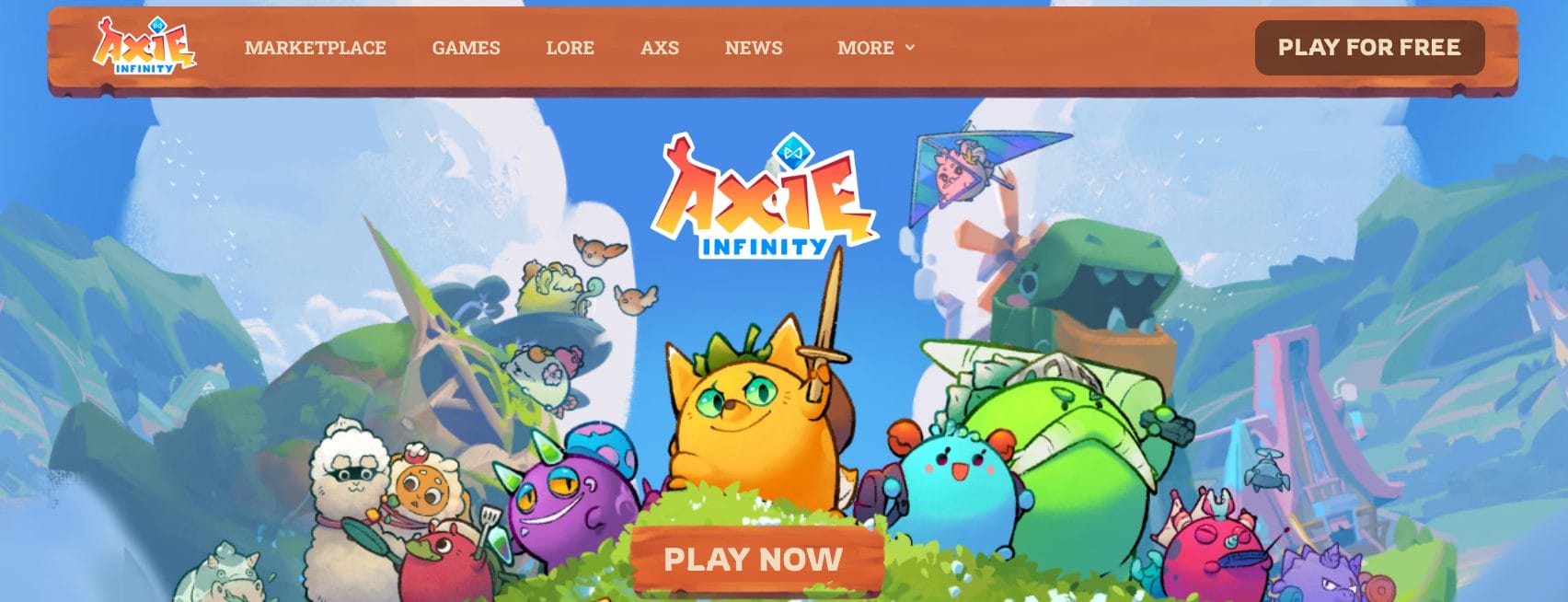
You can earn by participating in game modes like Adventure and Arena, collecting rewards in Axie Infinity Shards (AXS) and Smooth Love Potions (SLP), which are essential for breeding new Axies. AXS serves as both a governance token and a staking mechanism, enhancing engagement and providing investment opportunities.
The introduction of tokenized land plots allows you to build, customize, and earn passive income, making Axie Infinity not just a game, but an expansive digital nation with real economic implications. This combination of gaming and earning continues to attract new players, securing its position as one of the best P2E games in 2024.
Key Takeaways
- Axie Infinity offers a robust ecosystem on the Ethereum blockchain, where you can collect, breed, and battle unique creature NFTs called Axies.
- You can earn through Adventure and Arena modes using AXS and SLP tokens, which fund Axie breeding and provide gameplay rewards.
- The game introduced tokenized land plots for building and customization, offering a deeper layer of strategy and passive income opportunities.
12. Shrapnel — First-Person Shooter Released on the Biggest PC Game Marketplace
Shrapnel revolutionizes the play-to-earn landscape by blending intense battle royale action with a tactical extraction-based survival game. You must navigate a high-stakes environment where sound cues are crucial for survival — ambush or take cover based on the sounds of enemy movements. The game features high-quality graphics with neon-lit urban settings and fast-paced combat sequences.
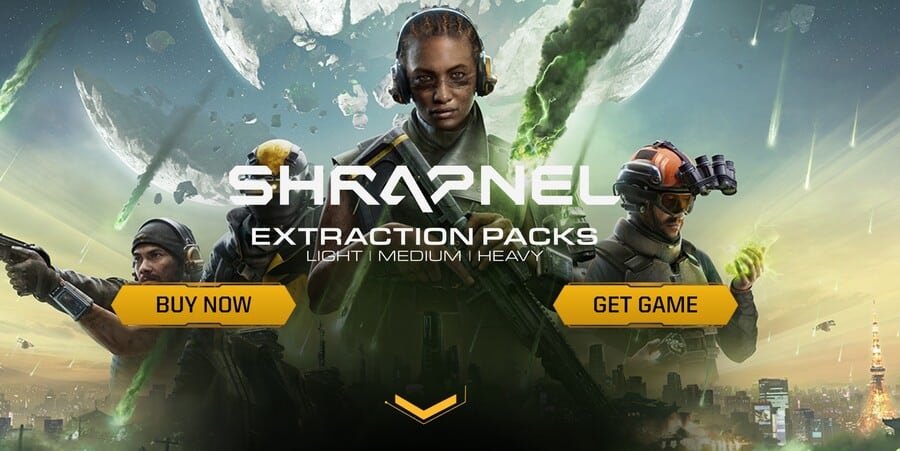
In Shrapnel, you must risk your gear to complete missions, gather loot, and engage in combat with other players and NPCs. Losses are significant, as dying means losing everything you carry. However, victories are equally rewarding with the opportunity to own and trade in-game items as NFTs, including gear, weapons, and maps, through a robust marketplace powered by the SHRAP token.
This ERC-20 token, launching on Avalanche, makes Shrapnel’s unique economy possible. In this game, your creations become your intellectual property, turning gaming achievements into real-world value.
Key Takeaways
- Shrapnel merges battle royale and survival gameplay with a focus on sound cues for strategic combat in an urban environment.
- You risk your gear to complete missions and combat, with the potential to lose or gain valuable in-game items, tradable as NFTs on a robust marketplace.
- Powered by the SHRAP token on the Avalanche blockchain, Shrapnel allows you to turn in-game achievements into real-world assets (crypto or fiat currency).
13. Star Atlas — Grand Strategy Game Enabling Space Exploration
Set in the year 2620, Star Atlas, a space-themed MMO built on the Solana blockchain, offers a metaverse where you can:
- Assume various roles, ranging from commanders and engineers to entrepreneurs
- Engage in activities like building, mining, and governing
- Earn by participating in Player vs Environment (PvE) and Player vs Player (PvP) modes
- Earn by exploring new planets and mining valuable resources that are tokenized within the game
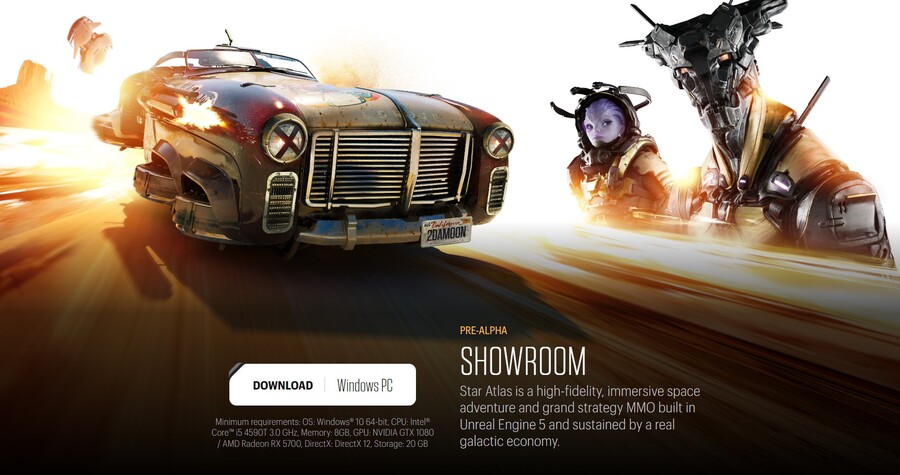
With a dynamic economy influenced by player actions and decisions, Star Atlas features a deep strategic layer where faction wars and resource management play crucial roles. You can invest in-game currency to build ships and navigate a grid map in search of NFT treasures and claim stakes, which provide passive resource gains.
By integrating NFTs and real-time strategy, Star Atlas offers an immersive gaming experience and allows you to monetize your virtual achievements.
Key Takeaways
- Star Atlas is a space-themed MMO set in 2620, where you can engage in roles like commanders, engineers, and entrepreneurs.
- It offers multiple earning methods through PvE and PvP modes, planet exploration, and resource mining, all integrated within a tokenized economy.
- It features a dynamic economy with strategic depth, including faction wars, resource management, and NFT integration.
14. Heroes of Mavia — Expand Your Army by Collecting Resources
Heroes of Mavia is a play-to-earn, base-building strategy game set in a vividly animated world. You start with a barren map and strategically build your base using various structures and defenses like turrets and mortars, which are vital for protecting resources and repelling enemy attacks. The game shines with its early troop variety — from the ground-pounding Striker to the aerial menace, Skyfire — allowing you to employ diverse battle strategies from the onset.
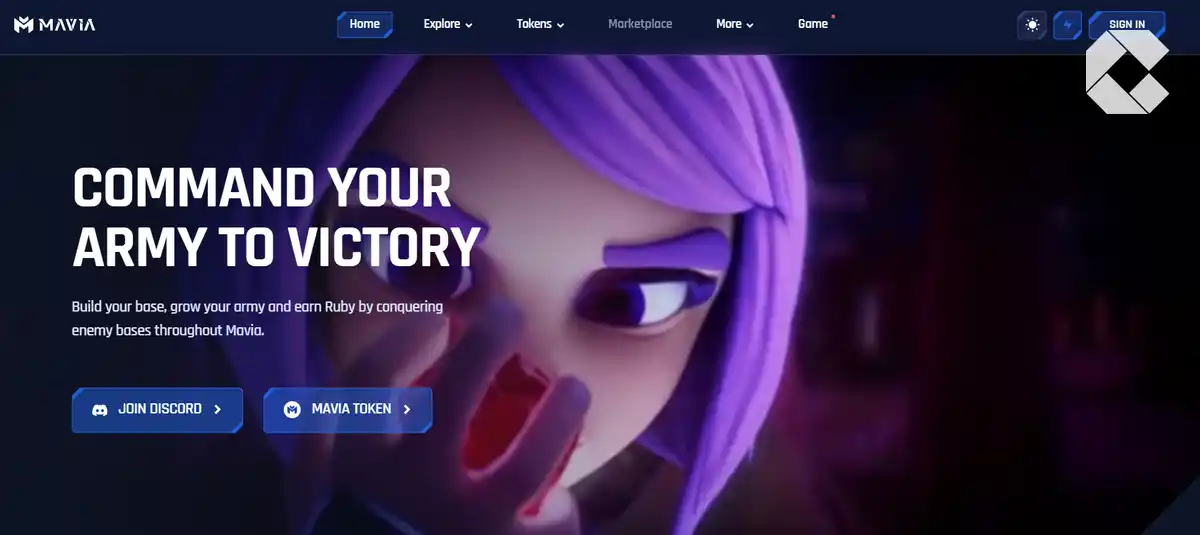
In Mavia, you create value through battles and conquests, with gameplay becoming progressively challenging as you enhance your base, army, and skills. Successfully attacking your opponents’ bases and effectively defending your base from enemy attacks allows you to earn Ruby.
Ruby can then be used to craft and trade Legendary NFT items within the mobile game’s Ruby marketplace. All Legendary NFT items are exchangeable for real-world value (fiat and cryptocurrency) through the Mavia Web NFT marketplace.
Key Takeaways
- Heroes of Mavia is a base-building strategy game where you start with a barren map and strategically construct your base.
- It offers a variety of troops for diverse battle strategies, enhancing gameplay as you progress in building and upgrading your base and army.
- Earn Ruby by attacking and defending bases, which can be used to craft and trade Legendary NFT items with real-world value on Mavia’s NFT marketplaces.
What Are Play to Earn Games?
Play to earn (P2E) games allow you to earn real-world rewards, typically cryptocurrencies or digital assets, through your in-game activities. These games integrate blockchain technology to secure ownership of in-game assets as non-fungible tokens (NFTs).
You can earn by carrying out tasks, winning challenges, or trading assets within the game. This model enhances engagement by providing financial incentives, and grants you ownership of your in-game assets, allowing you to sell or trade these assets outside the game. This approach merges gaming with economic activity, turning entertainment into a potential source of income.
How Do P2E Games Work?
Play to earn NFT games enable players to receive in-game currencies throughout the game by accomplishing certain feats. Below are some ways players are rewarded.
Land Selling or Renting
In metaverse games, such as The Sandbox and Decentraland, players can buy land in the form of NFT real estate. There are two ways NFT land owners can earn:
- Buy NFTs to add additional assets that make their property more valuable
- Rent out their NFT land
Several major corporations, such as Samsung and Adidas, have either bought or rented digital land in various NFT games to promote their brands.
Selling Unique Items
To advance in certain blockchain games, players need to discover or build unique items. These items could help them strengthen their team or defeat the enemy. But they can also be sold through in-game transactions to earn gaming crypto coins.
Competing
Certain NFT games reward players for unlocking each stage or defeating a challenger. These platforms reward highly-active players because they contribute to the ecosystem and help strengthen its network.
Types of Play to Earn Games
Blockchain features several types of free play-to-earn crypto games, some of which fall under multiple categories. Let’s look at the most popular ones.
Adventure P2E Games
NFT games, such as Star Atlas, enable players to play across multiple worlds, and explore a vast space, defeating others for potential rewards and collecting items that can then be sold to other users for in-game tokens.
Popular Adventure P2E Games
- Star Atlas (2023)
- BigTime (2023)
- League of Kingdoms (2020)
Card P2E Games
Card games require players to make strategically-wise moves to outwit their opponents. After defeating an opponent, players receive more valuable cards or reward tokens, which they can exchange for fiat currency.
Popular Card P2E Games
- Gods Unchained (2019)
- Splinterlands (2018)
- SoRare (2019)
Strategy P2E Games
In strategy P2E games, players have to allocate resources wisely to maximize their earning potential and progress faster within the game. There are often profitable opportunities within the game, such as rare item drops, lucrative quests, or high-value trades.
Many P2E games, such as Heroes of Mavia, offer guilds or communities where players can collaborate and strategize together to boost their progress in the game.
Popular Strategy P2E Games
- Heroes of Mavia (2024)
- Planet Mojo (2023)
- CryptoBlades (2021)
Real Estate P2E Games
Real estate play to earn games blend virtual property trading with blockchain technology. Players buy, sell, or develop virtual land as NFTs, earning real-world profits. Games like Decentraland allow users to manage digital assets, creating opportunities for both entertainment and investment.
Popular Real Estate P2E Games
- My Neighbour Alice (2022)
- Decentraland (2020)
- The Sandbox (2019)
Why Play P2E Games?
The best P2E games are played for several reasons, including making a profit and having fun.
P2E Games Let You Earn In-Game Assets
P2E games offer players in-game tokens for various contributions. Players can use those in-game assets to advance in the game or sell them for fiat currencies.
For example, in Axie Infinity, Axies are digital creatures that players can own as NFTs. Each Axie is unique and can be bred, battled, and traded within the game’s ecosystem. Players can claim these in-game items by purchasing them from the marketplace, breeding them, or earning them as rewards in gameplay.
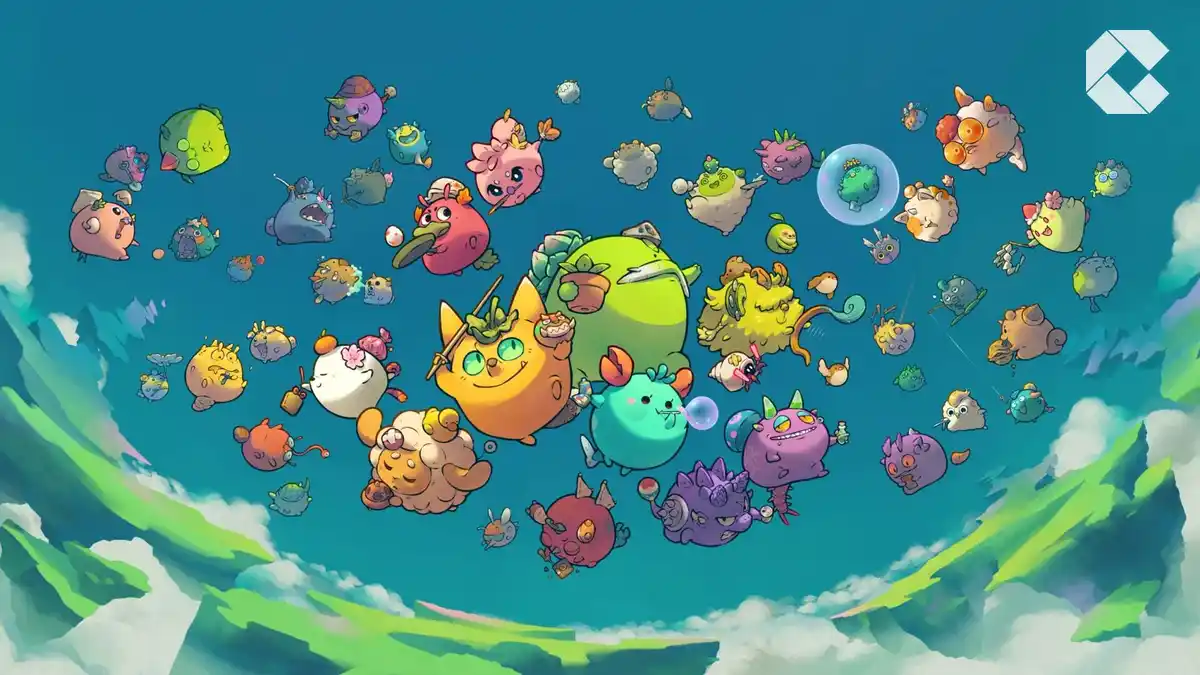
Another example is Splinterlands. SPL is the native cryptocurrency of Splinterlands, and players can claim SPL tokens by winning battles, completing quests, or participating in tournaments. On cryptocurrency exchanges that support SPL trading pairs, users can buy and these tokens for other cryptocurrencies, including BTC, ETH, and USDT.
P2E Games Are Fun
Many P2E games offer high-quality graphics and a gaming experience similar to the best video games — the chance to earn rewards is just a bonus.
For example, games like Heroes of Mavia and Ember Sword prioritize engaging and enjoyable gameplay alongside the potential for earning rewards. Maximizing profits, while important, is not the be-all and end-all.
Methodology: How We Ranked the Top P2E Games
In our assessment of the top P2E crypto games, we considered several factors that contribute to the overall appeal, sustainability, and potential of the games that made our shortlist. Below, we listed and explained each of these factors.
Number of Active Players (25%)
Active player count reflects the popularity and engagement level of a P2E crypto game. A higher number of active players indicates a thriving community and potentially better long-term viability for the game. A large player base is also likely to signal higher levels of liquidity within the game’s ecosystem, facilitating smoother gameplay experiences and more robust market dynamics.
Highest Earning Potential (25%)
The earning potential of a P2E crypto game directly influences its attractiveness to players. Games offering substantial rewards tend to attract more participants, and a game with high earning potential is more likely to retain players and foster a competitive environment, driving engagement and community growth.
Gameplay Quality and Enjoyment (25%)
Engaging gameplay mechanics, immersive narratives, intuitive user interfaces, and high-quality graphics contribute to player satisfaction and retention. Games that prioritize enjoyment alongside earning opportunities are more likely to sustain long-term interest and loyalty among players, contributing to the game’s overall success.
Sustainable Tokenomics (15%)
A well-designed token economy ensures a balanced supply-demand dynamics, prevents excessive inflation or volatility, and incentivizes desirable behaviors among players. Transparent and fair tokenomics instill confidence in the community and attract investors, fostering a healthy ecosystem around the game.
Continuous Game Development (10%)
Games that undergo iterative development cycles stay relevant in a competitive market, adapt to changing player preferences, and maintain momentum in attracting new users. Ongoing development efforts signal a proactive approach to innovation and sustainability, building confidence in the game’s future prospects among players and investors alike.
Upcoming New Play to Earn Games
New projects are added to the blockchain world daily. Below are some upcoming new play to earn games.
- Influence: A space-strategy MMO, where players colonize asteroids and exploit resources. It’s undergoing pre-release testing with mainnet launch imminent.
- Guild of Guardians: A multiplayer mobile RPG where players collect and upgrade a diverse array of guardians to tackle dungeon challenges. The global launch will take place on May 15, 2024.
- Space Nation Online: An MMORPG, featuring a rich space opera narrative and diverse characters. The open beta version will launch in May 2024.
- MetalCore: A free-to-play open-world shooter set in a futuristic space where factions vie for resources. An open beta version is expected by the end of 2024.
Can You Play P2E Games on Mobile?
P2E games are typically accessible through mobile devices, with the most popular operating systems being Android and iOS.
| P2E Game | Available on Android | Available on iOS |
| SpongeV2 | Yes | Yes |
| Axie Infinity | Yes | Yes |
| Splinterlands | Yes | Yes |
| Gods Unchained | Yes | Yes |
| League of Kingdoms | Yes | Yes |
| MOBOX | Yes | Yes |
| The Sandbox | Yes | Yes |
| Alien Worlds | No | Yes |
| Guild of Guardians | Yes | Yes |
| Hytopia | Yes | Yes |
| Heroes of Mavia | Yes | Yes |
| Illuvium | Yes | No |
Conclusion: What Is the Best Play to Earn Game in 2024?
We recommend Mega Dice Token as one of the best play-to-earn games to watch in 2024. This CasinoFi token offers high staking yields, and can be used to get daily rewards and access to NFTs.
$DICE is currently priced at $0.069 per token on presale, and has raised more than $320K.
FAQs About Play and Earn Games
How do P2E games work?
Players in play-to-earn games receive token rewards for accomplishing certain feats in-game. The platform rewards players with the in-game currency for contributing to the ecosystem and progressing in the game.
What P2E games can I play to earn money?
There are many play to earn crypto games on the market and in development, such as Mega Dice Token, Sponge V2 and Axie Infinity, that enable players to earn tokens that can be exchanged for fiat currencies.
Are play to earn crypto games legit?
Yes, play to earn crypto games are legit. Numerous P2E games provide players with entertainment and rewards.
What are the most profitable play-to-earn games?
Some of the most profitable play-to-earn games include Axie Infinity, The Sandbox, Splinterlands, and Mega Dice Token.
References
- Medium.com: Capital Maharaja Group Announced as Shareholder
- Yahoo.com: Epic Games Will List Web3 First-Person Shooter Game ‘Shrapnel’
- Time.com: A Crypto Game Promised to Lift Filipinos Out of Poverty. Here’s What Happened Instead
- Decrypt: This Week in Crypto Games: Sui Handheld, Saga Launch, Notcoin Airdrop Nears on 4/20
About Cryptonews
At Cryptonews, we aim to provide a comprehensive and objective perspective on the cryptocurrency market, empowering our readers to make informed decisions in this ever-evolving landscape.
Our editorial team, comprised of more than 20 professionals in the crypto space, works diligently to uphold the highest standards of journalism and ethics. We follow strict editorial guidelines to ensure the integrity and credibility of our content.
Whether you’re seeking breaking news, expert opinions, educational resources, or market insights, Cryptonews.com is your go-to destination for all things crypto since 2017.










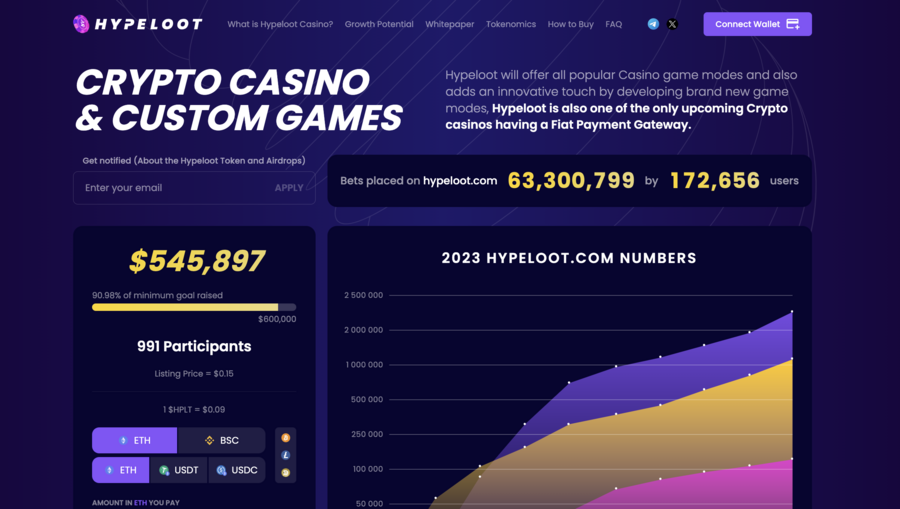

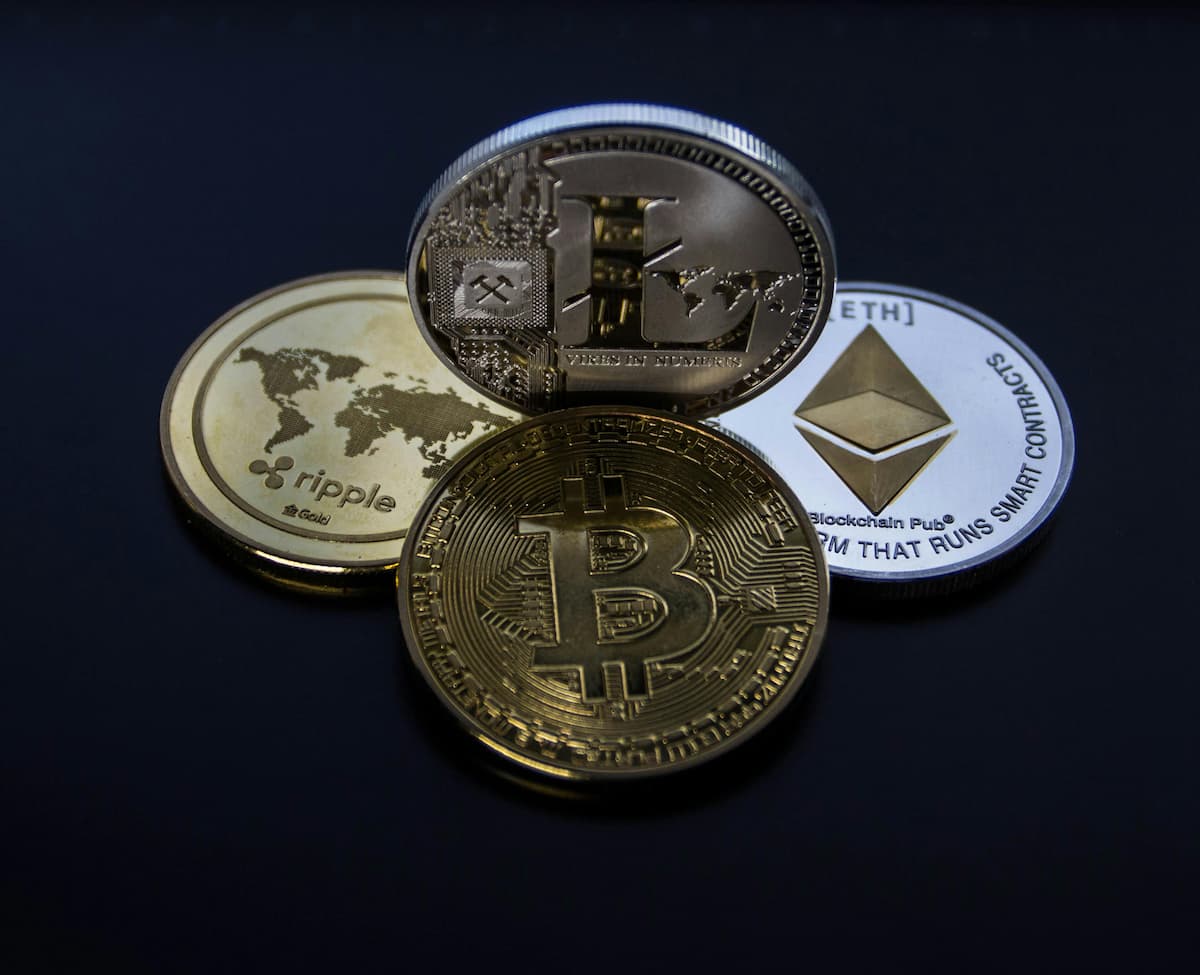
 Nick Pappas
Nick Pappas 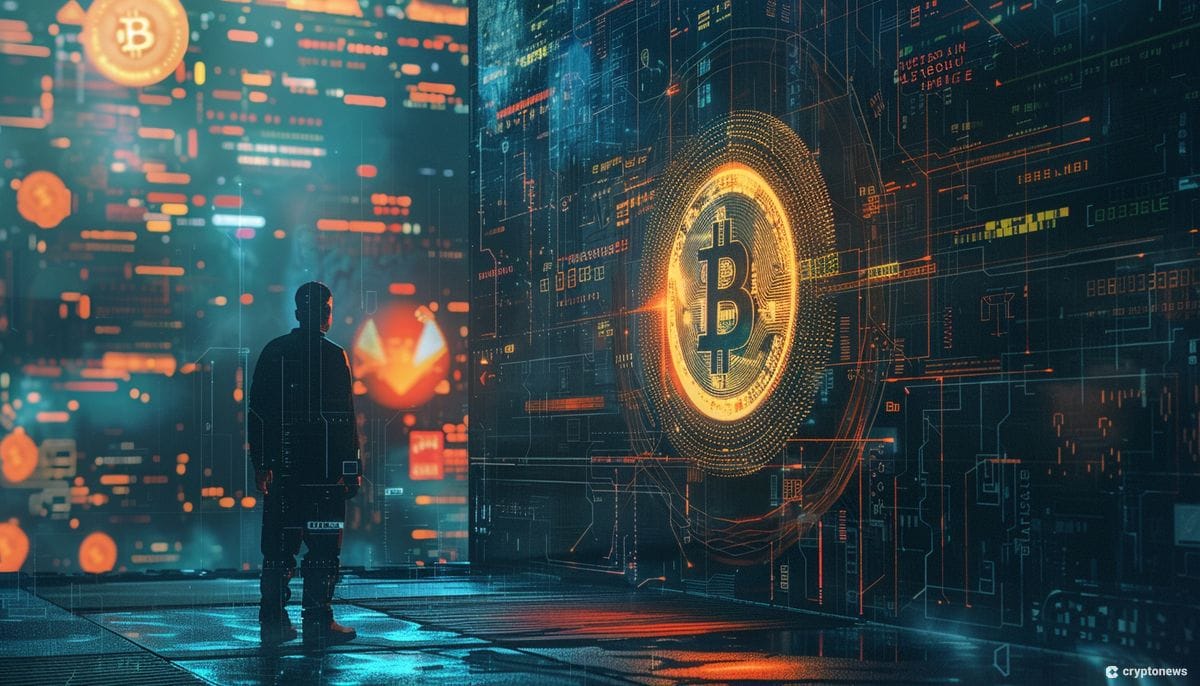
 Jay Leonard
Jay Leonard 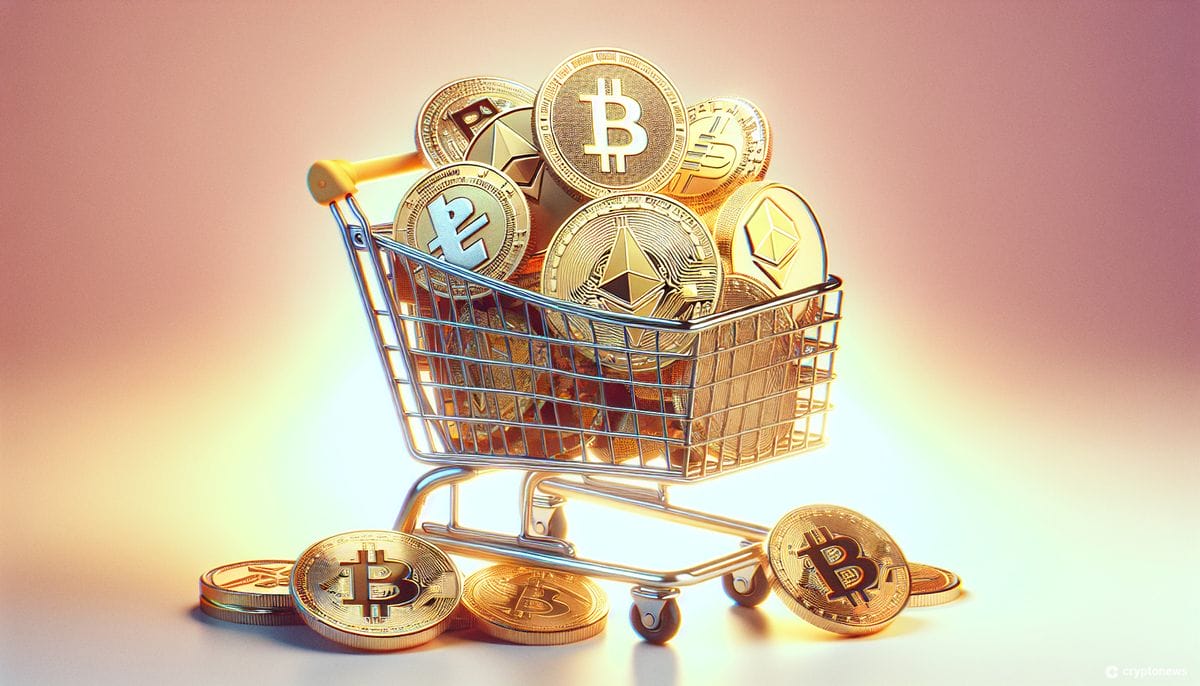
 Alan Draper
Alan Draper 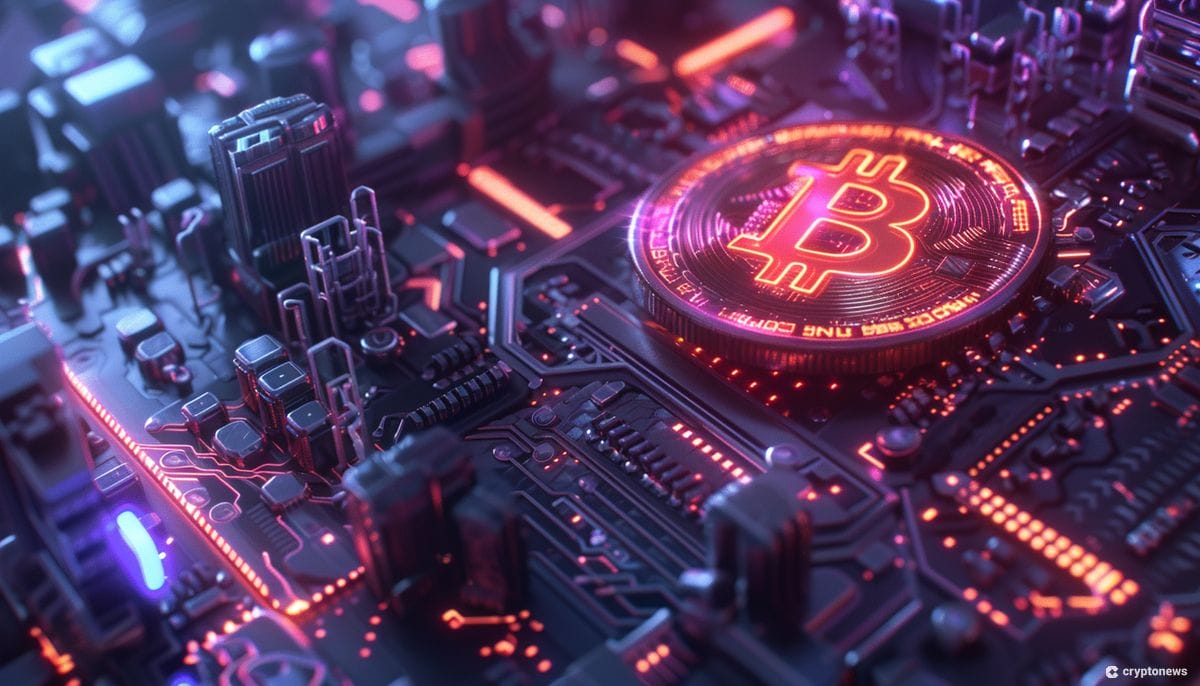
 Daniel Phillips
Daniel Phillips